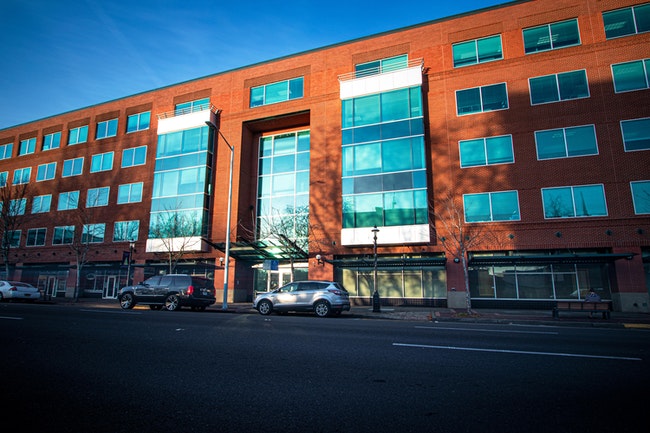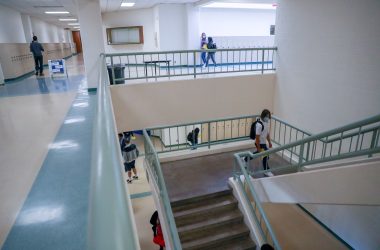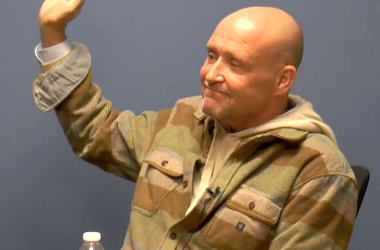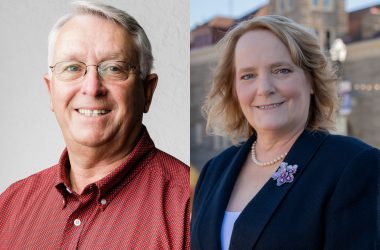 Marion County building in downtown Salem (Caleb Wolf/Special to Salem Reporter)
Marion County building in downtown Salem (Caleb Wolf/Special to Salem Reporter)
Salem Reporter wanted to know what issues were top of mind for the candidates seeking election as Marion County commissioner. We provided each candidate written questions intended to elicit their understanding of challenges the county faces and how they would overcome them.
One Marion County commissioner seat – a paid, partisan position – is open following the retirement of long-time Commissioner Sam Brentano.
Dan Norton and Ashley Carson-Cottingham are running as Democrats on the May ballot. Republican Danielle Bethell is unopposed for the May election and will face the Democratic winner in November.
Candidates are listed below alphabetically by last name.
Name: Danielle Bethell
Age: 41
Home: Keizer
Employer/position: Keizer Chamber of Commerce, executive director
Years at current job: 4
List leadership positions you have held in any nonprofit or civic organizations in the past five years.
2019- Salem-Keizer School Board, present director
2016- Keizer Chamber of Commerce, present executive director
2015-2019 McNary Athletic Booster Club, president
2017 McKay Athletic Booster Club, Turf project manager
2016-2018 Keizer Rotary Club, New Generations chair
List any government service in the past five years, including boards/commissions and any leadership roles.
Salem-Keizer School Board, director
In 300 words, please provide an example or examples of a project or issue you directly addressed in a leadership role. We are looking for examples of how your involvement resulted in specific action to resolve or improve a local issue.
I was recruited to be the director of the Keizer Chamber by members of the community. When I took the job there was a great lack of trust between the business community and city leadership. I spent time rebuilding this relationship, working to understand the issues in place and establishing pathways forward. Today, the City of Keizer and the Keizer Chamber of Commerce are collaborative partners on many projects, including being present to build and grow a community we are all proud to live in.
In 300 words, please provide an example of a decision you made or action you took later proved to be unsuccessful or misguided. We are looking for an example of how you deal with failure or mistakes.
Recently in one of my professional roles I engaged a colleague with some direct questioning. We are facing many challenges right now, and the current COVID-19 crisis has only heightened those challenges. At first, I felt just in my approach and questioning but after their response I saw and felt my mistake, deeply. I can be a hard charger at times, I am passionate about the roles I have been entrusted with, but in this case, I needed to ask the questions and receive the responses, but I also needed to take a longer pause and think about not only who was on the receiving end of those questions, but how they may be feeling or reacting in this crisis. Being a thoughtful partner in all efforts I engage is important to me, respecting their position, even if I don’t agree, is important to me. I appreciate that this leader took the time to reply and share a brief glimpse with me of how they felt and because of this I was able to engage and reflect, apologize and continue to work towards the solution.
What are the two most pressing issues facing the county?
Homelessness and public safety are the two most reoccurring issues we face in Marion County. But at the present the coronavirus and recovering from the economic shortfall are the most pressing issues.
What three steps would you take to improve those issues?
I believe the county is doing what they can to flatten the curve and stay ahead of the challenges we face because of the coronavirus. This week county commissioners began conversing with the local authorities by region. This is something I believe is critical to engaging the challenges as a team, not leaving anyone out of the conversation and being sure everyone has the information necessary to get us back to open. I also sit on two local economic recovery groups run out of the governor’s office, as a voice for small business and just this week we started the high level conversation of what’s ahead and how we work through it. An economic shortfall is ahead of us, state unemployment is the highest it’s ever been, small businesses are facing permanent closure or other major hardships so how do we get people back to work if less jobs are available, how are services paid for with less tax revenue?
1) Research and engage the issues directly;
2) Build collaborative county wide partnerships with all levels of leadership, city to state; we must also engage the business community in these conversations and solutions. This must be a county-wide effort.
3) Get to work, decisions need to be made to determine what does work and what does not and avoid reinventing the wheel. I am firm believer if something is working elsewhere, we should look and see what, if anything needs to be modified to work for us directly and implement.
To improve homelessness, I believe we need to work towards collaborative partnerships focusing on the roots of the issue. Homelessness is not always about mental health and drug abuse; it is also about the cost of housing or access to housing and lack of certain stable skillsets. I believe working together with cities and state government to overcome the barriers policy can dictate is a start. We must work with local health authorities and providers to identify the weaknesses in the mental health systems and then work to build a collaborative plan to eliminate these barriers and weaknesses. One area that is glaringly obvious is the shortage of mental health workers in Marion County. The wait is too long for most to be seen, and the costs are high. The supply and demand model needs attention.
Public safety in all communities is plagued by a lack of funds and high demands. I believe by reducing the major burdens brought on by the homeless, mental health and drug abuse challenges this system can find a new balance and operate within sufficient means.
Both issues are linked. We have asked our public safety officers to become frontline mental health workers. By doing this, we put added stress on an already overburdened public safety system.
How would residents’ lives improve from that outcome?
We are all impacted by the sights homelessness brings and burdened by the costs of those the system is supporting with mental health and drug abuse challenges. This is not a downtown Salem only issue. I have visited each city within the county during the last few months and the issue is everywhere. Salem sees a bulk of the crisis because that is where a bulk of the services are offered, therefore those experiencing homelessness navigate their way to the center. However, the smaller outlying communities suffer just as much; addressing this will improve all of our quality of life and finding stability in one’s life long-term will alleviate some of the burden on the public taxpayer-funded systems.
We are not just impacted by the financial aspect of these challenges, but by the emotional aspect as well. None of us want to see people going without and suffering. It’s human nature to want the best for those around us. These issues are present for all of us to face, they will not be overcome by throwing more funding, and certainly not by burdening businesses with the sole expense.
We also have many local residents who want to help. We see them setting up soup lines and delivering items to camps. Those residents are a resource we can harness to help elected leaders and public safety officers deal with the homeless issue.
Elected leaders at all levels need to lead with action, not just more conversation.
Identify three steps you would take to improve, change or adapt county operations. When listing the steps, please identify what issues you’re addressing and why you judge them a priority for the county.
Should I earn the necessary votes to win this election, I will be going into the job with an open mind. I do not want to prejudge what needs to be done before I get into the position. In my current position with the Keizer Chamber of Commerce and formerly at Marion County Fire District No. 1, I have learned that early on it helps to listen. Without knowing the “lay of the land” so to speak, it is hard to plot a new course should one be necessary.
The Marion County Commission works well and is a good steward of taxpayer dollars. I look forward to continuing that tradition.
In 100 words, describe why you want this office and how the county would benefit from your candidacy.
I want to see Marion County continue to be a livable, healthy community that I am proud to raise my family in. As a current voice for small business and a community focused person, I believe the county will benefit from my leadership because of my energy, determination and vision. I have worked my entire life to improve the places around me. From the climate for our small employers to the schools our children attend. I have experienced hardships and excelled through them, learned from them and bring that adversity to my decision making.
Name: Ashley Carson Cottingham
Age: 41
Home: Salem
Employer/position: state Office of the Long-Term Care Ombudsman, deputy agency director.
Years at current job: 6 with the state, seven months in current role
List leadership positions you have held in any nonprofit or civic organizations in the past five years.
None listed.
List any government service in the past five years, including boards/commissions and any leadership roles.
Office of Aging and People with Disabilities, Department of Human Services, director
Governor’s Prison Re-Entry Council, agency representative
In 300 words, please provide an example or examples of a project or issue you directly addressed in a leadership role. We are looking for examples of how your involvement resulted in specific action to resolve or improve a local issue.
Early in my tenure at the Office of Aging and People with Disabilities I put forth bold ideas on strengthening the safety and quality of long-term care to protect seniors and people with disabilities experiencing abuse and neglect. Ultimately, many of the ideas were incorporated into a comprehensive, bipartisan bill led by key legislators, during the 2017 legislative session. I worked tirelessly throughout the legislative session to provide consultation, advice and information to legislators and their staff to ensure the future law would truly improve the safety and quality of long-term care. The bill passed and was signed into law and has been implemented by the agency. It stands as the largest piece of legislation, dedicated to improving safety and quality in long-term care for Oregonians, in decades.
Additionally, as director of Department of Human Services Aging and People with Disabilities, I managed a $3.4 billion dollar biennial public budget made up of federal and state taxpayer dollars. The vast majority of the funds were used for services to Oregonians in need of long-term care. The legislature asked me to cut our budget during my tenure. By thinking outside of the box, I successfully managed through the reductions, while ensuring the least amount of human harm possible.
In 300 words, please provide an example of a decision you made or action you took later proved to be unsuccessful or misguided. We are looking for an example of how you deal with failure or mistakes.
I learned early in my career that making decisions that impact people, their services and supports or their organizations/businesses in a vacuum is not a good idea. For example, I was ready to release a policy report on an important topic, without all appropriate input. A good leader brings all voices to the table, receives input, comes up with solutions and options and works to broker compromise that will benefit the whole. When I realize that I have made a mistake, I do not hide it. I am vocal that I made a mistake and want to be the first person to let people know that I’ve made a mistake. Owning a mistake and coming up with the solution to avoid a similar misstep is key to rebuilding trust amongst stakeholders.
What are the two most pressing issues facing the county?
Emergency preparedness and homelessness
What three steps would you take to improve those issues?
1) Emergency Preparedness –
a) COVID-19 has shown that we are not prepared to save as many lives as we can in long-term care settings during an emergency because there is a lack of subject matter expertise at key decision-making tables. I will bring my knowledge and experience and convene the right group of stakeholders to ensure that any future disaster planning includes parties working closely from state, county and local governments to better-protect the most vulnerable among us.
b) Our emergency preparedness system is too siloed as it stands now. In my work at the state level – so much was determined to be the county’s responsibility, but yet the county may not fully understand/or always be prepared for the breadth of issues the state believes they are responsible for in a crisis. I believe this is resolved by building strong relationships, more inclusive processes and open communications channels. I have a record in doing these things to better serve the public. I would welcome diving into this issue as a county commissioner.
c) Expand county capacity to reach out and work directly with homebound seniors, veterans, and people with disabilities to ensure no one is slipping through the cracks in a crisis.
2) Homelessness –
a) Establishment of low-barrier shelters for people in need of temporary shelter but who aren’t yet in recovery or who have unique needs that cannot be met or are not allowed in existing shelter settings.
b) Establishment of additional women’s shelters.
c) Investment in further supports for our veterans and others suffering on the streets from PTSD and traumatic brain injuries as well as experiencing untreated mental or behavioral health issues.
How would residents’ lives improve from that outcome?
First, the unhoused resident would have critically needed shelter as well as access to tools and supports to eventually become permanently housed. Second, the rest of our community would be more safe and businesses in our communities would be less impacted by the crisis we’re experiencing.
Identify three steps you would take to improve, change or adapt county operations. When listing the steps, please identify what issues you’re addressing and why you judge them a priority for the county.
1) I would bring greater transparency to the decision making. The county budget is large and it is largely managed under the radar. It is important for all people living in the county to understand where their dollars are being spent and for what purposes.
2) I would increase outreach to underserved communities and make services more accessible to them. We have a diverse county and more effort needs to be dedicated to reaching people of color, immigrants, the unhoused, our LTBTQIA+ friends and neighbors and other people who need our support.
3) I would create an action plan for opening up internet access to all far reaching corners of the county. It is unconscionable that in today’s world we are leaving people in our county without the ability to connect to the internet for information, schooling and social connection.
In 100 words, describe why you want this office and how the county would benefit from your candidacy.
From the time I can remember, I have been a compassionate and dedicated public servant. Starting as a small child delivering Meals on Wheels to the homebound elderly and later as law student serving as a domestic violence hotline volunteer, to advocating in Washington, DC for elder abuse laws and more recently as a state government leader. I want to help as many people and entities as I can in our county. I am a hands-on leader with a track record of savvy budget management and creative solutions to tough problems.
Name: Dan Norton
Age: 56
Home: Salem, OR
Employer/position: Oregon Military Department, emergency management program coordinator
Years at current job: 1+ (retired U.S. Coast Guard officer w/ 23 years of military service)
List leadership positions you have held in any nonprofit or civic organizations in the past five years.
None.
List any government service in the past five years, including boards/commissions and any leadership roles.
Salem Community Emergency Response Team council member and CERT coordinator for South Gateway neighborhood since 2017.
In 300 words, please provide an example or examples of a project or issue you directly addressed in a leadership role. We are looking for examples of how your involvement resulted in specific action to resolve or improve a local issue.
During the response to the Deepwater Horizon oil spill, I was assigned by the U.S. Coast Guard to resolve several complex cleanup issues. One issue was a disagreement between a property owner and the state of Alabama with the Coast Guard’s decision to only lightly clean oil spilled on a barrier island of Dauphin Island, AL. The state of AL and the property owner wanted a deep cleaning while the Coast Guard believed the deep cleaning would cause unnecessary environmental damage. My job was to find an answer. I requested to and met with the state representatives on the island, walked the beach with them and listened to their concerns. Next I led a team of assigned scientists to evaluate expected environmental damage from the three possible cleaning options and rank costs versus benefits. We then discussed the results with the state representatives and negotiated a mutually agreeable answer. While both parties did not get exactly what they wanted, each group agreed to the solution knowing they had listened to each other and understood each other.
In 300 words, please provide an example of a decision you made or action you took later proved to be unsuccessful or misguided. We are looking for an example of how you deal with failure or mistakes.
When I was still fairly new to the military, I had a job reviewing industry contingency plans and a sharp enlisted man working for me. We had over 100 plans and new requirements that were not crystal clear. However, I received pressure from above to be very detailed in our reviews, even though the deadline to approve them was fast approaching. My enlisted man was becoming visibly uncomfortable, but didn’t speak up regarding his concerns. While we ended up completing our reviews, it damaged the morale of my staff who had to work overtime to complete it. Later I learned that my enlisted man had solid ideas on how to better handle the review process, but I failed to engage with him when I saw his discomfort. From this experience, I learned to develop stronger relationships with those I work with and to better listen to and trust those around me. We should all continue to learn and work to be a better person.
What are the two most pressing issues facing the county?
The two most pressing issues facing Marion County are the current health and economic disaster being caused by the coronavirus and preparing ourselves now for the next big disaster, likely the Cascadia Subduction Zone earthquake.
What three steps would you take to improve those issues?
A key issue to addressing the coronavirus is testing, and we must secure and deploy more testing. Selective and scientific use of limited test kits can allow effective modeling and an estimation of the population that currently has the coronavirus and who has had the Coronavirus (via antibody testing). With this information, the phased reopening can be implemented while isolating the infected and protecting vulnerable people (elderly and immuno-compromised) and while getting many of us back to work. While there is some risk to any reopening strategy, it has to be balanced against the expected economic damage. However, until we have a vaccine, we should all be prepared for some discomfort and a period of social distancing.
While we are deeply involved in this current coronavirus disaster, we must also not lose sight of preparing for the next disaster that will come. For residents of the Pacific Northwest, the Cascadia Subduction Zone earthquake is our next disaster, and we are overdue for it. But we can greatly lessen the impact of a big earthquake by taking known preparations now. These include residents having a two week ready stock of food and supplies at home, having a family emergency plan, and preparing your home. For the Marion County government, preparedness means more training and funding for Community Emergency Response Teams, robust and tested county emergency plans, earthquake retrofitting of fire stations and emergency services buildings, and retrofitting select bridges and overpasses to ensure they are usable immediately following an earthquake.
How would residents’ lives improve from that outcome?
Selective and scientific use of limited coronavirus tests together with population models will provide insight into the best strategies on when and how to safely and best open up our communities. We can minimize health risks and still get business open and our jobs back. Earthquake preparations now will save lives and diminish suffering when our expected big earthquake strikes. Preparations now will also speed recovery and minimize damage to our jobs and economy.
Identify three steps you would take to improve, change or adapt county operations. When listing the steps, please identify what issues you’re addressing and why you judge them a priority for the county.
Transparency and inclusive decision-making – On the whole, actions taken by the county should be transparent, open for public review, and always comply with Oregon’s Public Records and Meetings Law. Government is responsible to serve the people. I’ll work to improve our processes so that our county is transparent with our actions and that we are inclusive to the public when making decisions. Transparency and inclusion helps build public trust and provide necessary public feedback on our actions.
New business opportunity partnership – I believe the county should work with area businesses and our community college to make Marion County a magnet for new businesses. We need a system that encourages new business start-ups, and provides incentives like short-term tax breaks, lower-cost rents in business parks, and business and academic partnerships to advise new business owners to help their success. This is an effort to attract new, good jobs to the county and helps to make Marion County a great place to live.
Work to improve county homeless population issues – The Marion County government needs to work very closely with the City of Salem to improve issues regarding the homeless. We should look to provide temporary low or no-cost housing, a minimum level of health care, mental health, job and substance abuse counseling. While we offer a hand up, we should also enforce health and sanitation ordinances. Downtown Salem must remain a safe and vibrant shopping and business area.
In 100 words, describe why you want this office and how the county would benefit from your candidacy.
I want to continue to have Marion County be a great place to live and work. We do this by ensuring our quality of life, the quality of our natural resources, and by sustaining our agricultural and forestry resources. Sustainable natural resources will ensure jobs and income now and for future generations. My 24+ years of leadership and management experience with military, federal, and state government will go to good use listening to, involving, and helping county residents.









